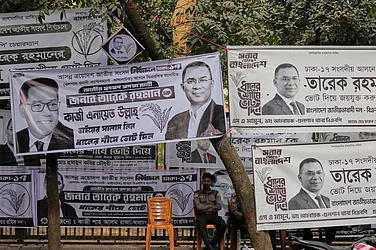Manisha Ropeta has scripted history in Pakistan after becoming the country's first Hindu woman to become Deputy Superintendent of Police (DSP).
Ropeta cleared the Sindh Public Service Commission (SPSC) examination last year and ranked 16th on a merit list of 152 successful candidates. She is undergoing training and will be posted as the DSP in the crime-infested area of Lyari.
Ropeta wants to lead a feminism drive in Pakistan, a country that's one of the worst for women with problems like physical and sexual violence, honour killings, and forced marriages. Here is all you need to know about her.
Who is Manisha Ropeta
Manisha Ropeta, 26, is from Jacobabad in Pakistan's Sindh province.
Ropeta initially wanted to be a doctor — like three of her sisters. But she failed to clear her MBBS entrance examination by one mark.
She told PTI, "I then told my family I was taking a degree in physical therapy but at the same time I prepared for the Sindh Public Services Commission examinations and I passed that, getting 16th position among 468 candidates."
Ropeta's three sisters are doctors and her youngest brother is studying medicine. Her father, who passed away when she was 13, was a trader in Jacobabad. She was brought up by her mother who after her husband’s death shifted with her children to Karachi.
What inspired Manisha Ropeta to join police
Manisha Ropeta said in an interview that she felt women victims need women protectors and this need inspired to join police.
She told BBC, "Where most of the victims are women, there the protector also needs to be a woman. So it's a huge need that we have women protectors. With this inspiration, motiven I wanted to go for police."
PTI reported that Ropeta believes women are the target of many crimes and are the "most oppressed" people in male-dominated Pakistan.
Physical and sexual violence, honour killings, and forced marriages make Pakistan one of the worst countries for women. The 'Global Gender Gap Index' of the World Economic Forum had ranked Pakistan third from the bottom a couple of years ago. Pakistan was ranked 151 out of 153 countries.
Almost 70 per cent of women in Pakistan have been victims of domestic violence at least once in their lives, according to another report by Pakistani NGO Aurat Foundation that works for rights of women. This violence is generally committed by their intimate partners – husbands.
Manisha Ropeta beat many odds
Manisha Ropeta had to beat several odds on her way to become Pakistan's first Hindu woman DSP. These odds stacked against her ranged from lack of enthusiasm for girls' education and societal stereotypes to lack of faith in her in her own family.
Beating all odds, Ropeta is thrilled to have "proven wrong" her relatives.
She told BBC, "My close relatives had an odd belief that I would change my field [of police] in some time and that I could not continue it. It's not their belief about me but it's the social stereotype that a girl cannot be a police officer, specially from our community [Hindu community]."
Ropeta also said society thought there were only two professions for girls. She told PTI, "From childhood, I and my sisters have seen the same old system of patriarchy where girls are told if they want to get educated and work, it can only be as teachers or doctors."
Manisha Ropeta wants to drive change, lead feminism drive
Belonging to a middle-class family, Manisha Ropeta told PTI that she wants to end the notion that girls from good families should refrain from joining the police service or working in district courts.
As Pakistan's first Hindu woman DSP, Ropeta is now looking forward to take on new challenges: to be a "women protector" by leading a feminism drive and encourage gender equality in a patriarchal society.
She said, "I want to lead a feminism drive and encourage gender equality in the police force. I myself have always been very inspired and attracted to the role of the police force."
Ropeta feels her working as a senior police officer will empower women and give them authority.
She told BBC, "I can say it's [a change] coming. They [her relatives who thought she'd leave polcing job soon] would retract their statements in a year and perhaps one of their daughters will join the police."
Ropeta admits that though it is not easy to be in a senior position in the Sindh Police and to get on-field training in a place like Lyari, she said her colleagues, superiors and juniors treat her with respect for her views and hard work. She is also hopeful of playing a big role in portraying a better image of the police whom many people still do not trust and do not want to deal with to report the crimes.
Before Ropeta, Pushpa Kumari from Umerkot district had passed her examination and joined Sindh Police as the first Hindu assistant sub-inspector.
Manisha Ropeta also teaches at a coaching institution
Besides getting on-field training in crime-infested Lyari, Manisha Ropeta also teaches at a private academy.
She told BBC, "I also teach at a private academy. I guide them. This is very encouraging for me. I feel many girls with my guidance can get ahead. That [her guidance] may be encouraging for them."
In photos shared by CSS Comex Academy, a coaching institution in Pakistan's Karachi, Ropeta can be seen teaching students.
(With PTI inputs)


























